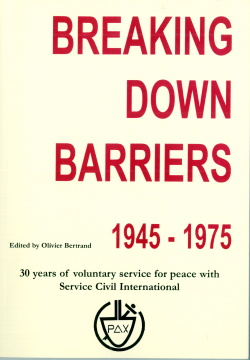Ann (Smith) Kobayashi
First contacts with SCI
In 1965 I had been in my first full-time job as a social worker in England for 18 months when I heard about the IVS (British branch of SCI) LTV programme from my flat-mate who had met the IVS secretary at a party! At the time of applying to be an LTV the idea of voluntary work in a developing country seemed more challenging than statutory social work with the marginalised and in many cases desperately poor, people in a London Borough. In retrospect of course, I realise it was change and adventure I was seeking.
As I subsequently discovered, IVS unlike most other SCI branches and especially those in Asia, did not require LTV applicants to be members of a local IVS group or to have had any previous work-camp experience. During the LTV orientation programme I cannot recall learning anything significant about SCI’s history or structure. I was, however, sent to my first work-camp - a Rudolf Steiner community near Ulm, Germany - where I white-washed cow-houses, gathered hay and talked about world peace, conscientious objection and was introduced to a vegetarian menu. It was a wonderful break from 12-hour days spent in Juvenile Courts, police stations, Children’s ‘Homes’ and endless report writing.
Accepted as LTV - 1965
Initially IVS assigned me to a Fishermen’s Cooperative in an Indian village where the major project was to improve the fishing nets. Even I realised that my fervent, uninformed, wish to do good would not outweigh my complete ignorance of any type of fishing and net-making. Fortunately for the Cooperative I could not leave my job in time to join the project; happily for me I went to Bangkok where I joined Morag Beaton, a Scots LTV, and worked as an English teacher.
Our principal task in Bangkok was to run a British Council English Course for Thai teachers of English in cooperation with the Dept. of Secondary Education. We were also assigned to teach in several secondary schools. It was a busy, daily schedule and every evening teachers and students came to visit our room in the Teachers’ hostel to practise their English or take us to meet their families. With Tony Kidd, the other Bangkok-based LTV, we began to build a group interested in SCI and on Saturdays went to a large psychiatric hospital to talk and dance with the patients. Later we also did some work in a school for visually impaired children. Tony was the main mover and largely through his efforts, an international work-camp was organised at a Health Centre in the rural, impoverished and therefore politically unstable, North-East. By then, through correspondence with Sato-san, SCI Asian Secretary, we had begun to realise that he did not view our teaching project as an ideal SCI placement. We and others had gone to Thailand as IVS volunteers understanding that our main contact point was IVS National Office which expected, although didn’t always get, regular progress reports; only gradually did some of us become part of SCI. Support from Claire and Olivier Bertrand, SCI representatives in Bangkok, and a visit from Phyllis Sato also encouraged us to see the larger SCI context but not to feel overly defensive about the project; at one stage we had begun to feel caught between the conflicting expectations of IVS and the Asian Secretariat. So it is always interesting when searching questions begin to puncture assumptions that you are doing the right thing!
When Morag finished her year, I moved out to live with a Chinese-Thai family which included two young women university students. They became enthusiastic about SCI and voluntary work. The SCI group began meeting at the house; with Tony’s continuing support after I had left, it eventually became a fully fledged national branch. For most of the Thai students SCI was their first encounter with the concept of volunteering to work alongside people from different economic/social backgrounds in rural areas; the presence of foreign volunteers was probably less challenging and certainly we were made to feel very welcome. Few of my many non-student Thai friends had the luxury of choosing to attend a project or work-camp because of family financial commitments but their great kindness, warm hospitality and patience with an often clumsy foreigner, made all the difference to my stay.
Return home via Japan - 1967
I travelled to Singapore where I stayed with the Sato family while waiting for the MM boat to Yokohama. Shigeo Kobayashi, then SCI Japan Secretary, arrived on that MM boat from an SCI National Secretaries’ meeting in Sri Lanka so we met in May 1967. I had intended to stay in Japan only for as long as it took to buy boat and train tickets for the USSR but it somehow seemed to make economic sense to wait until autumn when the Trans-Siberian ticket would be cheaper! Staying with Mieko-san in her little room beside the SCI office which was always crowded with Japanese members and foreign volunteers, cooking, writing, discussing camps together, I met people who are still good friends. I also did two camps in Kimpu, an international camp organised by SCI Korea near the border with North Korea, and worked at an orphanage in Hiroshima. ]
[Note: See Shigeo Kobayashi’s piece for the description of their marriage and many years in Kimpu.]



